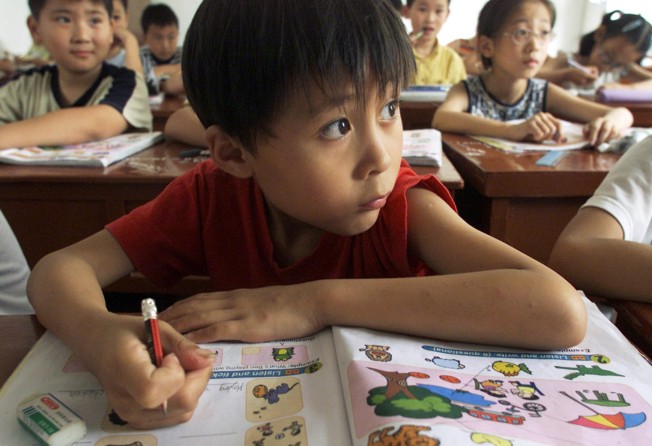Call to reduce English lessons to ‘save’ Chinese
Wang Xuming, ex-spokesman for the Education Ministry, says foreign-language lessons are hurting children's grasp of native tongue

A former senior education official has triggered heated debate after he publicly denounced the teaching of English to young children and called for more classes on Chinese traditional culture.
Wang Xuming, a former spokesman of the Education Ministry and now president of Language and Culture Press, wrote on his verified Sina microblog account that China should abolish English classes in primary schools and commercial English schools for children. Instead, it should increase the number of classes on guoxue, or national study, which refers to the study of Chinese traditional culture.
"[We should] free the children and save the Chinese language," he wrote.
In 2002, the Ministry of Education ordered primary schools across the country to teach English classes, starting from the age of nine in the third grade, but it is now common for first-graders to have English classes.
Wang, who boasts more than 1.8 million followers of his microblog, said he proposed more lessons on guoxue because the quality of Chinese-language textbooks and examination results were so weak, while English-language teaching materials and performance results were strong.
He later published a lengthy online comment to elaborate on his opinions on "hitting the brakes on English learning by children across the country", saying Chinese language as the mother tongue had been facing numerous challenges.
"Many Chinese cannot use the language properly. Chinese language and its characters are gradually being marginalised … It's a practical measure to protect the Chinese language by cancelling or reducing English lessons and increase enthusiasm for studying the Chinese language," Wang wrote.
He called on education authorities to ban English studies in junior years of primary school and make it a selective course beginning in senior years of primary school. English tests should be removed from entrance examinations for high schools and universities, while examinations on Chinese-language should be increased.
Meanwhile, profit-driven English tutorial schools, especially those targeting young children, should be limited or abolished, Wang wrote.
Public opinion over Wang's remarks is divided. Some people argue that the academic load primary students bear is already too much, so they should focus on learning their mother tongue. Others say stopping English classes would not necessarily guarantee better Chinese-language skills.
The six-year-old daughter of Ding Xiaohan, a private business owner in Shanghai, is in first grade at a public primary school, and she takes three English-language classes a week. Ding said she found it "unbelievable" to consider cancelling them. "If I had a say, I would prefer more English classes, not cancelling them," said the 36-year-old, who majored in English at university. "English-language ability as a tool is very important, and surely it's much easier to learn it when you are young."
Zhang Xiaohui, 31, a mother of a two-year-old boy in Beijing, supported the idea of increasing the number of Chinese-language classes, but that did not have to come at the expense of eliminating English classes.
"I like the idea of putting more Chinese classics in textbooks. I think we could take away the translated literary works from other countries. Education officials can wait when children grow up and read the books in English, even an abridged copy," Zhang said. She would teach her son English when he reached the age of three, she said. "I started to learn English only when I was in middle school. I believe his command of the English language will be much better than mine," Zhang said.
Tao Sha, professor of developmental psychology at the National Key Laboratory of Cognitive Neuroscience and Learning at Beijing Normal University, said there was no scientific evidence to suggest that studying a second language would hurt the study of a mother tongue.
It was also scientifically proven that learning a language at an early age made it easier to learn it, although it did not mean people could not learn a language at a later age, Tao said. "It is just easier. You will be amazed at the language skills of children," Tao said.